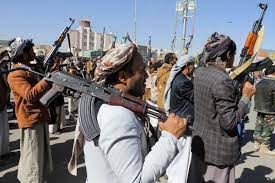It was among Joe Biden’s initial significant choices regarding foreign policy.
In January 2021, less than two months after assuming office, the US president revoked two “terrorist” designations against the Houthi rebels in Yemen that his predecessor, Donald Trump, had placed on them.
The action was taken in “recognition of the dire humanitarian situation in Yemen,” according to Secretary of State Antony Blinken at the time. Humanitarian organizations, US lawmakers, and the UN had all cautioned that the country’s aid supply might be disrupted by the designation of “terrorists.”
After a string of attacks in the Red Sea, the Biden administration is now, nearly three years later, reimposing one of the designations against the Houthis: “Specially Designated Global Terrorist group” (SDGT).
Once more, political analysts and advocates for human rights are warning of the potential harm this decision may cause to Yemeni civilians.
Many others wonder if the Houthis’ attacks will cease as a result of Wednesday’s designation.
“I’m really worried about the terrible effects on common Yemeni citizens,” stated Afrah Nasser, a former Human Rights Watch Yemen researcher and current non-resident fellow at the Arab Center in Washington, DC.
The Houthis and a coalition led by Saudi Arabia and the United Arab Emirates have been engaged in a war for years in Yemen, and Nasser told Al Jazeera that the designation runs the risk of exacerbating the country’s humanitarian crisis.







